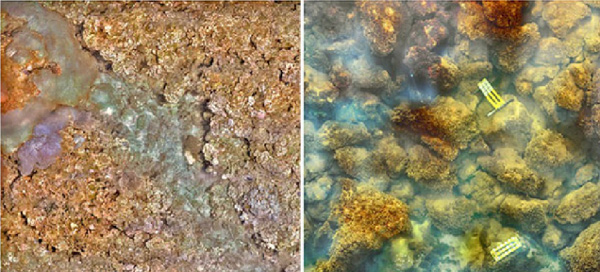What will the ocean look like in 100 years?
By studying coral populations in response to the changing marine environment, scientists have drawn a wild picture 100 years later.
The transformation of the ocean 100 years later
The island of Maug actually consists of three volcanoes, rising from the offshore of the Pacific Ocean . Beneath the volcano, carbon dioxide spills into the surrounding marine environment. The shallow waters around the former volcano are the habitats of coral reefs now replaced by algae that cling to the rocks.

Scientists say that too much carbon dioxide in water is bad news for corals. They will cause coral reefs to be damaged and scientists are studying how to save Earth's oceans in response to this environment which is increasingly absorbing more carbon dioxide.
Researcher Ian Enochs (of NOAA) and colleagues studied coral populations and carbon dioxide levels in the waters around Maug. The group has just released its results in Nature Climate Change.
"This is a proof that ocean acidification is increasing leading to dramatic changes in ecosystems and algae, " said researcher Ian Enochs. Corals often secrete calcium carbonate to form their skeleton. The problem is that in an environment where carbon dioxide makes water more acidic, calcium carbonate can be dissolved and corals are therefore unlikely to grow.
When volcanoes release carbon dioxide, coral reefs will die, algae (which contain a better acid environment than corals) will grow and so the corals have died. Of course, algae cannot replace the role of corals in the ocean ecosystem . Corals provide food, shelter for creatures and protect the coast from the impact of storms. In other words, mutant algae growth due to dead coral can cause imbalance in marine ecology.
The development of algae that replace dead coral reefs is a future picture of the ocean scientists have predicted. This is also a warning that the research team sent people to call for more attention to saving the marine environment.
- Bacteria sleep 100 million years in the Arctic Ocean
- When people put the ocean to the end
- Ice in the Arctic Ocean
- Mars used to have a huge ocean
- 3 billion years ago gold in the ocean is 10 times more than today
- Video: The scenery on the ocean floor if the water is dry
- Explore the ocean
- A new ocean is forming
- The first 3D map sheet redraws the entire ocean on Earth
- The mysterious 'spooky' series in the ocean
- The ocean will be boiling after 300 years
- The tribe live separately 55,000 years on the Indian Ocean Islands
 'Fine laughs' - Scary and painful torture in ancient times
'Fine laughs' - Scary and painful torture in ancient times The sequence of numbers 142857 of the Egyptian pyramids is known as the strangest number in the world - Why?
The sequence of numbers 142857 of the Egyptian pyramids is known as the strangest number in the world - Why? History of the iron
History of the iron What is alum?
What is alum?